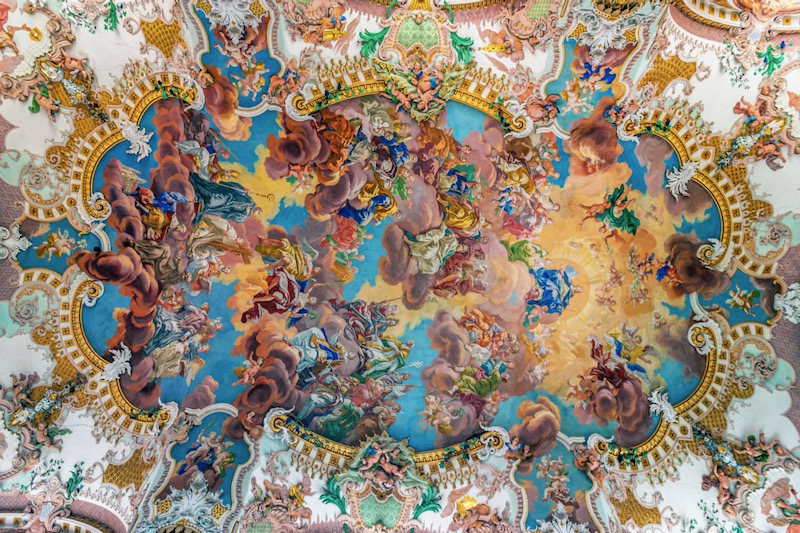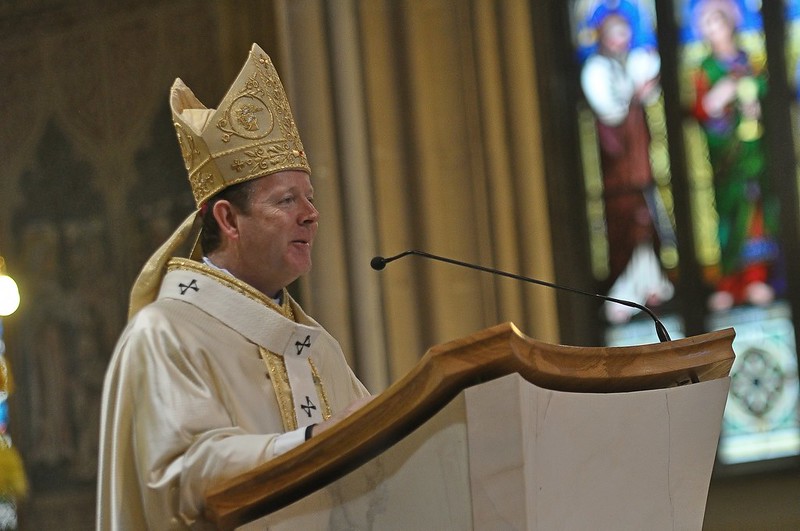Partition polarised people in Northern Ireland and “institutionalised difference”, the head of the Catholic Church in Ireland has said.
Archbishop Eamon Martin was speaking at a service today at St Patrick’s Church of Ireland Cathedral in Armagh to mark the centenary of partition of the island of Ireland and the formation of Northern Ireland.
In his reflection, told the congregation of 130, including the British Prime Minister, Boris Johnson, and the Irish Minister for Foreign Affairs, Simon Coveney, that partition remains “a symbol of cultural, political and religious division between our communities”.
He continued: “Looking back at what had happened on this island in 1921, like many others in my community and tradition, I do so with a deep sense of loss; and also sadness.”
Archbishop Martin recalled how growing up in Derry city, he had often crossed the border to visit his granny and other relatives a few miles away in Inishowen. “At first, we did so through customs, and then, in later years, through heavily fortified checkpoints. It was as if my home city had been cut off in 1921 from its natural hinterland in beautiful Donegal.”
In his reflection, the Primate of All Ireland said church leaders could have done more to deepen their understanding of each other and to bring healing and peace to their divided and wounded communities.
He highlighted how Jesus had grown up in the midst of political and cultural division and of deep-seated historic difference. “But he taught his disciples to build bridges of love and forgiveness. When he was asked, ‘Who is my neighbour?’ he pointed to the Good Samaritan who crossed social and historic barriers to show love and mercy to the one who was on ‘the other side’.
“That is why I stand here today, as a disciple of Jesus, with my brothers and sisters in faith, hopeful and committed to doing what we can to build a better future for all, a future in which mistrust and division can become things of the past.”
The service at St Patrick’s Cathedral in Armagh was an initiative of the Church Leaders’ Group, comprising the Church of Ireland and Roman Catholic Archbishops of Armagh, the Moderator of the Presbyterian Church, the President of the Methodist Church and the President of the Irish Council of Churches.
Ahead of the service, they emphasised their wish is to gather in prayer for the healing of relationships, and to demonstrate a renewed commitment to working together for peace, reconciliation and the common good in Northern Ireland.
They said the service would be underpinned by a Christian vision of reconciliation, “which calls us to acknowledge the pain of the past, confess our own failings and commit ourselves to peace”.
The group had said they were conscious from the outset that the centenaries would “highlight painful moments from our past which continue to impact relationships in our present”.
The Irish head of state, President Michael Higgins, declined an invitation to attend the service. He said that what had started out as an invitation to a religious event had turned into a political statement.
Queen Elizabeth had been due to attend the service but withdrew on Wednesday on medical advice.
Partition divided the island of Ireland in 1921 and established a sectarian state in the six counties that comprise Northern Ireland, in which Catholics were discriminated against for decades in areas such as housing, employment, policing and education.
In his homily, the President of the Methodist Church in Ireland, Reverend Dr Sahr Yambasu, said Northern Ireland had been “blighted by sectarian divisions, terrible injustices, destructive violence, and by win-lose political attitudes”.
He lamented Northern Ireland’s failure to choose a way forward that could be mutually beneficial.
“Born and raised in Sierra Leone, on the continent of Africa, I speak as one whose people were bought, sold, and used for profit; whose continent was partitioned without any reference to or consultation with its inhabitants and owners; and whose colour is seen as sufficient excuse to ignore their equal humanity with others,” Dr Yambasu told the congregation.
He said that “building an equal and just future is costly. It is a moral imperative needing moral courage to fulfil. Embracing different others is not about promoting oneself. It is about creating space for each other to flourish. It is not about assimilating them into ourselves.”
The Moderator of the Presbyterian Church in Ireland, Rev Dr David Bruce, said in his reflection that that he lamented, “the physical and emotional pain which has been caused over this last century to so many people by violence and the words which lead to violence. For now, I grieve the times when fear has held us back from building relationships with those with whom we differ.”
He told the congregation: “If we are to build a better future then we must recognise our own woundedness and our responsibility to care for the wounds of one another.”
The Church of Ireland Primate of All Ireland, Archbishop John McDowell apologised as a church leader that they did not do more “to become peacemakers, or at least to speak peace into the situation”.
“Too often we allowed the attitudes around us to shape our faith, rather than the other way round. That’s certainly what I mean when I say we have too often been captive churches.”
He warned that people are “obsessing” again about borders rather than thinking about what a good society would look like.
“There are still far too many people who live with poverty of many kinds-educational, economic, emotional. Far from creating a society with a common purpose, the pandemic and some recent political developments have exposed just how fractured a society we’ve become,” he said.



 Loading ...
Loading ...